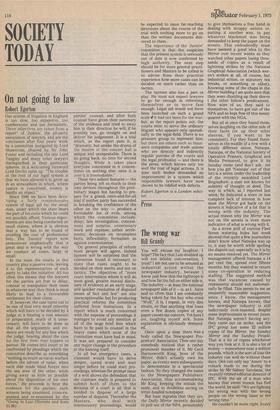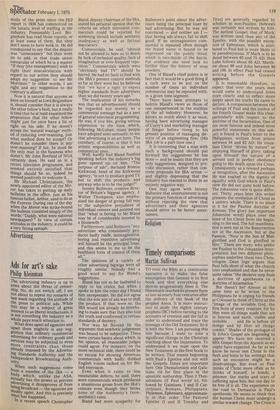Press
The wrong war. Bill Grundy
You will excuse my laughter, I hope? The fact that I am doubled up will not inhibit conversation, I trust? I am not one to be amused at industrial action within the newspaper industry, because I know just how thin the tightrope is and how far the fall on either side is. The industry — at least the national newspaper side of it — is, as I have said so often that I am constantly being taken for the boy who cried "Wolf," it is, I repeat, in very dire straits, so that anything that loses even a few dozen copies of any paper causes me concern. Yet here I am, laughing myself sick. Some explanation is obviously demanded.
Once upon a time there was a body called the Newspaper Proprietors' Association. Then one day somebody noticed that a rather prominent member of it, Mr Cecil Harmsworth King, boss of the Mirror, didn't actually own his paper, as events were subsequently to demonstrate in a spectacular fashion:So they changed the name to the Newspapers Publishers' Association, thus accommodating Mr King, keeping the initials the same, and so doubtless saving on letter-headed notepaper.
But base ingrates that they are, the Daily Mirror recently decided t6 pull out of the NPA, presumably to give themselves a free hand in dealing with stroppy unions or, putting it another way, to pay whatever blackmail was being demanded to keep the paper on the streets. This undoubtedly must have seemed a good idea to the Mirror over recent weeks as they watched other papers losing thousands of copies as a result of lightning strikes by the National Graphical Association (which weren't strikes at all, of course, but industrial action, or statutory tea breaks, or something or other).
Knowing some of the chaps in the Mirror building I am quite sure that they were chortling up their sleeve t the other fellow's predicament. How wise of us, they said to themselves, to have got out of the NPA and so kept free of this messy quarrel with the NGA.
But all at once they found themselves laughing on the other side of their faces (or up their other sleeves, if you want to be consistent). For they found themselves in the middle of a row with a totally different union, Natsopa. Natsopa, or the National Society of Operative Printers, Graphical and Media Personnel, to give it its Sunday name (and don't ask' me how you get 'Natsopa' out of that lot) is a union under the leadership of the recently ennobled Lord Briginshaw, a man not known for subtlety of thought or deed. The way in which, as I reported last week,, he indicated a more or less complete lack of interest in how, soon the Mirror got back on the streets is indicative of a lot that is wrong with the industry. The actual reason why the Mirror was not on the streets is even more indicative of what is wrong with it.
As a straw poll of various Fleet Street watering holes last week showed that quite a few journalists didn't know what Natsopa was up to, it may be worth while spelling the dispute out, especially as it is by no means resolved yet. The Mirror management offered Natsopa a 14 per cent rise, spread over fifteen months, but they wanted in return some co-operation in reducing staffing. The suggested method was that vacancies caused by retirements should not .automaticaUy be filled. This seems to me an eminently reasonable suggestion, since I. know, the management knows, and Natsopa knows, that the newspaper industry is still ludicrously over-manned, despite some improvement in recent years. But Natsopa weren't having any, they came out on strike, and the IPC group lost some 22 million copies of the Mirror, the Sunday Mirror and the Sunday People. That is a lot of copies whichever way you look at it. It is also a lot of money — somewhere near a million pounds, which is the sort of loss the industry can well do without these days. One can only say 'Amen' to a remark made to me during the strike by Mr Sidney Jacobson, the recently retired editorial director of IPC. With the air of a man who knows that sweet reason has fled the world, he said: "We are fighting the wrong war with the wrong people on the wrong issue at the wrong time."
He couldn't be more right. Every
Spectator February 1, 1975
study of the press since the PEP report in 1938 has commented on the lunatic level of staffing in the industry. Presumably Lord Briginshaw has read those reports, or at least some of them. But they don't seem to have sunk in. He did condescend to say that the dispute was "unnecessary" but then went on to add, in that trade union vernacular of which he is a master "If they [the management] wish to right their miscalculation with regard to our action they should adopt my suggestion' to see Mr Mortimer." In other words, I am right and any suggestion to the contrary is at;surd.
Now it is natural that anyone as keen on himself as Lord Briginshaw IS, should consider that it is always the other fellow's fault, but it really is time that he at least examined the proposition that the other fellow might just for once have a bit of right on his side. If he doesn't accept the 'natural wastage' method of reducing over-manning, just what method does he accept? Or doesn't he consider there is any over-manning? If not, he must be the only man in the business who doesn't. Mr John Bonfield of NGA certainly does. He said so in a recent television programme, and seemed entirely satisfied that things should be so; indeed he seemed positively to welcome it.
Mr Michael Christiansen, the newly-appointed editor of the Mirror, has taken to putting up daily bulletins in the office, just as his famous father, Arthur, used to do at the Express. During one of the day when the Mirror was strike-bound the bulletin consisted simply of the words: "Daddy, what were national newspapers?" In view of certain attitudes in the industry, it could be a very fitting epitaph.
Advertising



































 Previous page
Previous page